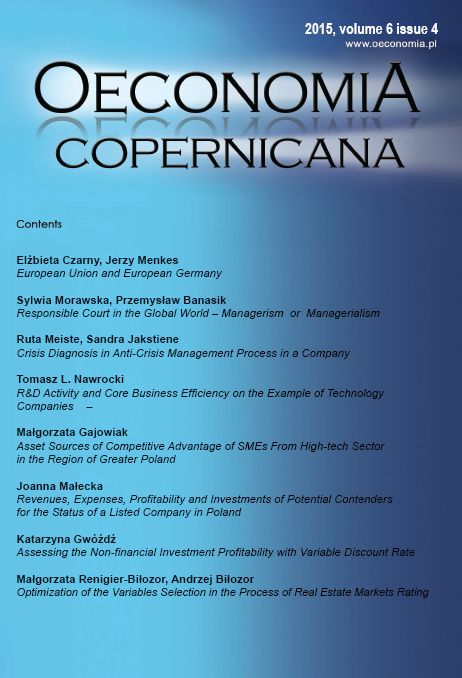Responsible court in the global world ? managerism or managerialism
DOI:
https://doi.org/10.12775/OeC.2015.027Keywords:
effectiveness, efficiency, justice system, globalization, regulatory arbitration, forum shoppingAbstract
One can look at the improvement of the effectiveness and efficiency of the justice system from three perspectives: macro, mezo, and micro. After all, the general goal is to enhance the effectiveness and efficiency of the justice system as a whole (the macro perspective), the courts (the mezo scale), and court proceedings (the micro scale). The need to improve the effectiveness and efficiency of the justice system was noticed in the Strategy of modernization of justice in Poland in the years 2014?2020 prepared by the Ministry of Justice incorporates the three abovementioned perspectives. From the perspective of this paper, emphasis has been placed on courts. The Strategy, as a matter of fact, assumes that the improvement of the effectiveness and efficiency of courts may occur by introducing a model of management based on the idea of ?managerialism? to run them. Effective and efficient courts, just like the proceedings they operate, are particularly important in the face of globalization, regulatory arbitration, as well as forum shopping. Based on a case study, this paper outlines the results of an innovative pilot project of implementing management methods of running common courts, and sets out to answer the question of the extent to which the state of institutional development of courts allows one to employ good practices in courts already successful in the world of business. During the pilot study, in 60 selected regional, district, and appellate courts, with the support of external experts, ?good practices? were implemented to serve as management enhancements (Final report?, 2014..). The results of the pilot study prove that the level of institutional development of courts determines the possibility of introducing good management practices that have already been approved in the world of business. This situation is further complicated by the diverse level of institutional development among courts. The type of a given court (its size, regional, district, appellate) may impact the possible upgrade of the maturity of the way a given practice functions. Also, not all business practices are eligible for implementation, given the different level of managers? competence, as well as the frequently clear process of taking on the management staff.
Downloads
References
Banasik, P. (2014). Management and the trust to the justice system. Business Science Quarterly, 4(33).
Banasik, P., & Niestrój, J. (2014). The concept of good practice. The improvement of the image of the court prepared as part of the implementation of the pilot project of good management of units of the justice system in the Project ?PWP Education in time management and the costs of legal proceedings ? case management?. Operational Program Human Capital for the National School of Judiciary and Public Prosecution. Warszawa (Unpublished).
Chuda, A., & Wyrwicka, M. K. (2013). The culture of the service enterprises. Scientific Journals of Poznań University of Technology, Organization and Management, 59.
Czakon, W. (2007). Coopetition as the instability of inter-organizational Network of the enterprises. In A. Potocki (Ed.). Mechanisms and areas of transformation in organizations. Warsaw: Difin.
Czakon, W. (2009). Coopetition ? the confluence of creation and appropriation of values. Organizational Review, 12.
Chapter House of Legal Professions and the Report of the meeting of the Chapter House of Legal Professions of 27 January 2015. Retrieved from http://oirp.gda.pl/komunikaty (14.03.2015).
Final report of the basic and supplementary pilot projects of innovative management methods of common courts (2014). WYG International, WYG Consulting, WYG PSDB, University of Economy in Cracow, Allerhand Institute, Warsaw (Unpublished).
FOR report: The courts at the docket 2013. The clarity and efficiency of work. Retrieved from http://prawo.rp.pl/artykul/792777,1061862-Sady-na-wokandzie-2013--Przejrzystosc-i-wydajnosc-pracy.html (07.03.2015).
Kargul, A. (2012). Institution economics and the changes in the business environment and other trends in economic science. In T. Pakulska (Ed.). Business and the environment. Influence, effects. Warsaw: Warsaw School of Economics Publishing House in Warsaw.
Kołodko, G. W. (2011). The introduction to the Polish edition. In N. Roubini & S. Mihm. The economics of the crisis. Warsaw: Wolters Kluwer business Publishing House.
Kołodko, G. W. (2013). Where is the world heading? Political economy of the future. Warsaw: Prószyński i S-ka.
Koźmiński, A. K., & Latusek-Jurczak, D. (2011). The development of the theory of the organization ? from the system to the network. Warsaw: Oficyna Wolters Kluwer business Publishing House.
Koźmiński, A. K., & Latusek-Jurczak, D. (2014). Inter-organizational relations in the science on management. Warsaw: Wolters Kluwer business Publishing House.
Matejun, M. (2012). Case study method ? the exemplification of the use in the science on management. Economic Studies of the Łódź Region, 7.
Rodrik, D. (2011). One economy, many recipes. Globalization, institutions and the economic growth. Warsaw: Krytyka Polityczna Publishing House.
Roubini, N., & Mihm S. (2011). Ekonomia kryzysu. Warsaw: Wolters Kluwer Publishing House.
Sadowski, W. (2007). Forum shopping a national jurisdiction exempted in the ordinance No 44/2001 (Brussels II). In W. Czapliński & A. Wróbel (Eds.). Court cooperation in civil and criminal cases. Warsaw: C.H. Beck.
Sadowski Z. (2010). Liberalism and the understanding of the role of the state in the market economy. In E. Mączyńska & P. Pysz (Eds.). The Library of the Economic Concepts, Warsaw: Polish Economic Society.
Stiglitz, J. E. (2005). Globalization. Warsaw: PWN.
Stiglitz, J. E. (2010). Freefall. New York: W. W. Norton & Company, Inc.
Strategy of modernization of justice in Poland in the years 2014?2020 (Unpublished).
Szymański, W. (2011). Economic uncertainty and instability. Sudden increase and what then?. Warszawa: Difin.
Tkaczyk, T. (2005). The risk and uncertainty in the global conditions. In E. Mączyńska (Ed.). Economic aspects of the insolvency in Poland. Warsaw: IFGN SGH.
Vissak, T. (2010). Recommendations for Using the Case Study Method in International Business Research. Qualitative Report, 15(2).






